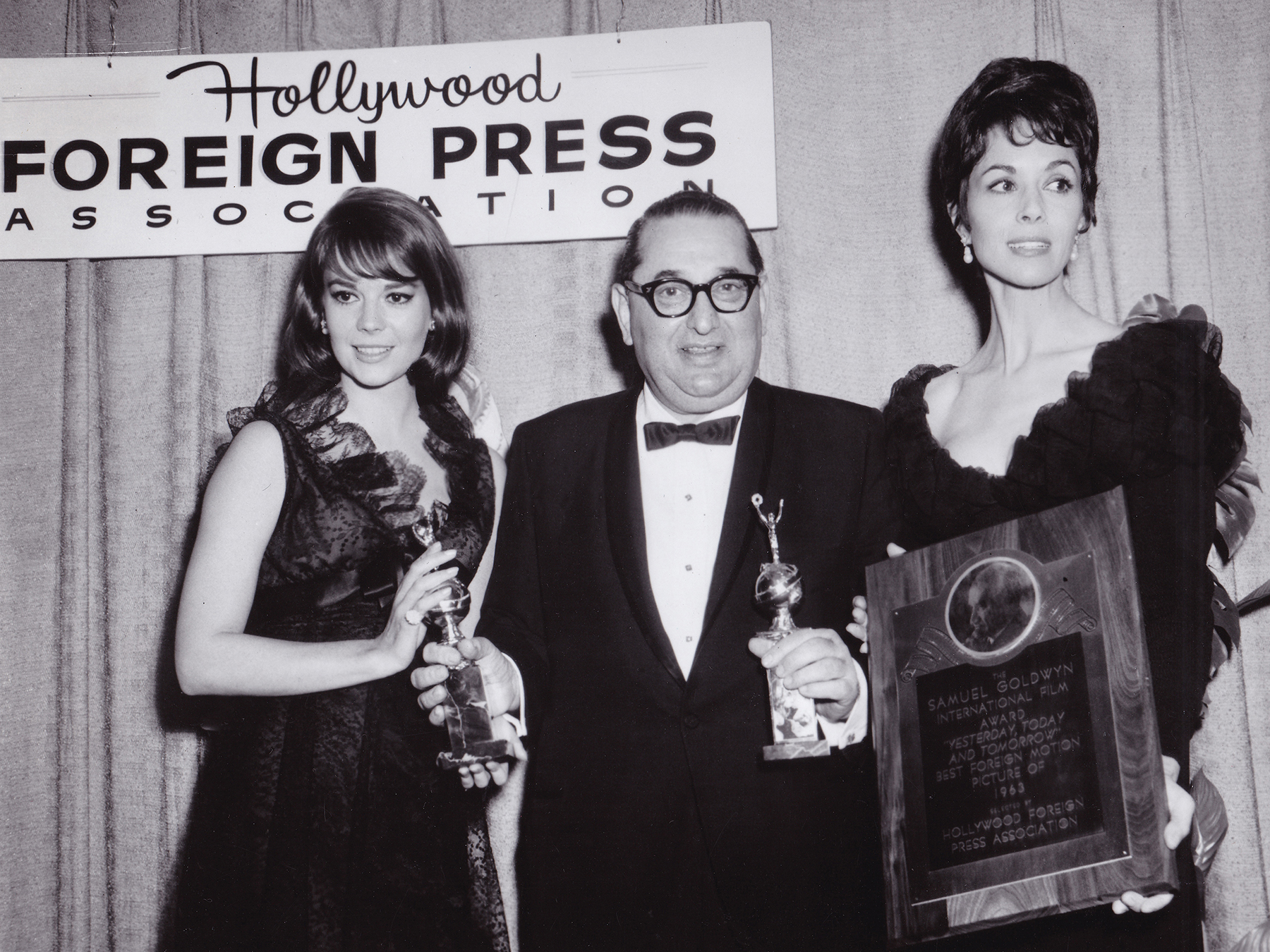
- Cecil B. DeMille
Ready for My deMille: Profiles in Excellence – Joseph E. Levine, 1964
Beginning in 1952 when the Cecil B. deMille Award was presented to its namesake visionary director, the Hollywood Foreign Press Association has awarded its most prestigious prize 66 times. From Walt Disney to Bette Davis, Elizabeth Taylor to Steven Spielberg and 62 others, the deMille has gone to luminaries – actors, directors, producers – who have left an indelible mark on Hollywood. Sometimes mistaken with a career achievement award, per HFPA statute, the deMille is more precisely bestowed for “outstanding contributions to the world of entertainment”. In this series, HFPA cognoscente and former president Philip Berk profiles deMille laureates through the years.
Although Joseph E. Levine produced a number of great movies, the Cecil B. de Mille honoree’s greatest contributions were his innovations in film distribution and promotion.
These included changing the title of his acquisitions, for example Walking into Paradise became Walking into Hell, and it became a hit. Double- featuring films with similar titles: the public was intrigued. Acquiring American rights to foreign films for peanuts and then spending a fortune on promoting them. For example, the Japanese Gojira became Godzilla, King of the Monsters, and spawned innumerable money-making sequels. Adding sound effects and redubbing Italian epics, his biggest success Hercules which became one of the highest-grossing films of that year. Acquiring de Sica’s Two Women, and then underwriting Sophia Loren’s promotion of the film, convinced that she would win the Oscar. She did. Lastly, never wavering from selling his own name: “Joseph E. Levine presents” was always the first image in any of his films.
Born into poverty he found his way into the industry by acquiring one movie house, then another, which eventually became a chain, and through his genius for promotion, these investments proved highly profitable. Eventually, a position at Burstyn Mayer led to a distribution deal with American International Pictures, a schlock studio that capitalized on everything that Levine had pioneered.
In the mid-’50s he formed his own company Embassy Pictures, and with the success of Godzilla and Two Women, he made a deal with Paramount that gave him a respectability that enabled him to make both exploitation films and prestige movies.
His name was rarely on screen as producer or executive producer, but early on he served as such on Sidney Lumet’s Long Day’s Journey into Night, for which Katharine Hepburn was nominated for both a Golden Globe and an Oscar, and on Jean Luc Godard’s Contempt. His first huge success was The Carpetbaggers, based on Harold Robbins’ bestseller for which Elisabeth Ashley was nominated for a Golden Globe as Best Supporting Actress and was named the Globes ‘Most Promising Newcomer’. He followed that with another bestseller, Where Love Has Gone, the title song of which was both a Globe and Oscar nominee.
He executive produced De Sica’s Marriage Italian Style, which won the Golden Globe as Best Foreign Film, produced Harlow with Carroll Baker, for which Red Buttons earned a Golden Globe nomination as Best Supporting Actor, and executive produced Darling which made an overnight star of Julie Christie and earned her the Oscar as Best Actress as well. A sequel to The Carpetbaggers, Nevada Smith was a big success for Steve McQueen.
A run of mediocre films encouraged him to sell his company to AVCO, an aviation conglomerate, but retaining his title as executive producer, a move he later regretted, but one which turned his career around. Among the classics Avco Embassy produced, were Mike Nichol’s The Graduate, which won five Golden Globes including Best Motion Picture Comedy, Best Actress for Anne Bancroft, and Best Director. Mel Brooks’ The Producers, and The Lion in Winter, his favorite movie, which won a Golden Globe for Best Picture Drama and Best Actor for Peter O’Toole, were his other achievements. Levine also produced Nichols’ controversial Carnal Knowledge, for which Ann-Margret won the Golden Globe as Best Actress, and Liliana Cavani’s equally controversial The Night Porter.
Resigning from his Avco Embassy role, he independently mounted one of the biggest movies of the decade assembling an all-star cast to tell the story of the battle of Arnheim. A Bridge Too Far, based on the bestseller by Cornelius Ryan, ended up a disappointment, although guest appearances by Robert Redford, Ryan O’Neal, Sean Connery, and Gene Hackman enabled the film to recoup its staggering cost. Even though Levine used every trick in his book to promote the film, it failed to get a single Golden Globe or Oscar nomination. His follow-up movie, Magic, fared better and in fact, made a star of Anthony Hopkins who received a Golden Globe nomination as Best Actor in a Drama.
His classic movies (as an entrepreneur): The Graduate and The Producers, although after first viewing the latter movie, he agreed with the studio heads to shelve the picture, and it might never have been released had it not been for Peter Sellers who happened to see it at a private screening, demanded the studio release it at one theater in London, and the rest is Hollywood history.
Levine received his Cecil B. deMille in 1964.